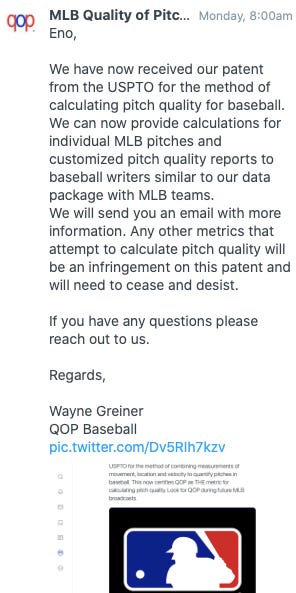
1. TikTok
We have a TikTok deal? Maybe? Sort of?
A few weeks ago when Trump announced that the government was going to force the sale of TikTok, I said that even if Trump was going about the sale the wrong way—key money!—it was a good thing. Because allowing TikTok to continue to operate in the current configuration was a threat to national security.
Readers objected to me giving Trump credit for doing something helpful. The general tenor of these objections was, “You are a fool to trust anyone this corrupt to do anything right.”
Point taken. My apologies.
As a “private” Chinese company which ultimately answers to the Chinese government, TikTok poses two challenges to the United States.
The first danger is that TikTok is gobbling up the private information of U.S. citizens. It can do whatever it wants with that information. If the Chinese government asks for it, TikTok will give hand it over.
The second danger is that TikTok surfaces—or hides—videos according to its proprietary algorithm. If the Chinese government decides that it wants TikTok to only show American users videos in which someone declares that, for instance, the results of the 2020 election are illegitimate, then that is what TikTok will do. Or, if the Chinese government forbids TikTok from showing videos in which users say that China is abusing human rights, then TikTok will suppress those videos.
In other words, TikTok is a giant propaganda cannon which is ultimately controlled by an authoritarian country with strategic interests opposed to our own.
And this second danger far, far outweighs the first. Allowing TikTok to operate in this way would not be all that different than the FCC giving a broadcast license to the Russian government.
Which is why I said it was good that Trump was forcing the sale of TikTok.
But in the end, the joke is on me. Because the TikTok “sale” Trump just blessed only addresses the first problem—user data security—while entirely side-stepping the biggest problem—giving the ChiComs the power to determine what information this massive platform shows Americans.
This “sale” to Oracle and Walmart gives the American companies “ownership” of the user data, but not the TikTok algorithm. Which remains entirely in under the control of the Chinese.
[T]his deal is the worst possible outcome:
First, there is at best a marginal gain in U.S. data security, which probably wasn’t a concern in the first place.
Second, there are only fig leaf improvements to the question of the recommendation algorithm, which will have zero impact on very real concerns around the Chinese Communist Party’s ability to censor and push propaganda to U.S. consumers.
Third, the very concept of the rule of law is in shambles, as the only real change from the original Microsoft deal is to ensure that ByteDance keeps the company while Trump donors get a cloud deal.
This last point can’t be made enough: this deal is significantly worse than the original Microsoft deal that Trump squashed, but unfortunately for Satya Nadella, he wasn’t a big Trump donor. I hate to be cynical, but it’s honestly hard to see what else mattered.
I was a fool to have expected anything less.
2. More from Amos Williamson
You guys all seemed to really like the Prophet Amos yesterday, so I also want to share his post script to me about the future of conservatism and the Republican party:
In a piece a couple months back, Jonah Goldberg wrote that one of the reasons he likes the post-apocalyptic genre is that one of his favorite intellectual games is to imagine how people would change and what they would become absent the rules, structures, and traditions of civilization.
I think, at least in regards to conservative politics, he has the tense wrong: Imagine instead that the apocalypse happened in 2015 (for lack of a better marker, imagine the apocalypse was Obergefell) and we're now living in the aftermath. Your typical positivist conservative is no longer accurately described as “conservative” (in the small-c sense). They do not wish to preserve what presently exists because what presently exists they find intolerable. What they want is either restoration or vengeance.
In the strictly amoral, get-what-you-want and climb-the-greasy-pole sense, who would you consider to be the most successful politicians of the last 5 years?
On the left, I think the obvious answers have to be Bernie Sanders, Alexandria Ocasio-Cortez, and Kamala Harris. Sanders managed, with two unsuccessful presidential campaigns, to dramatically move the center of gravity of a party he didn’t even belong to in ways unimaginable a decade ago. AOC is a freshman in Congress of whom the same-party Speaker is afraid. Harris has gone from state AG to the Senate to (likely) the vice presidency and heir-apparent to an obviously one-term president.
On the right, I think the answers are Mitch McConnell, Dan Crenshaw, and Josh Hawley. McConnell cares above all things about staffing the judiciary (since that's where half of real legislation happens; the other half being executive agencies). Crenshaw is a house freshman who has managed to build a distinctive brand that is vaguely Trumpy but not actually associated with Trump personally. Josh Hawley has gone from state AG to senator to likely debate-stage presidential candidate with the inside track for the hard-edged, populist, social-conservatism lane, also with minimal overt personal fealty to Trump.
You know what all those people have in common? None appeal to constitutional principle but rather to overriding, non-constitutional principles.
That's the future.
Trump will likely try to make either Don Jr. or Ivanka heir-apparent. That is already (allegedly, according to people who float around the people who float around the WH) the only actual plan for his second term.
Since he probably loses, I doubt that takes.
He'll buy OANN or something similar to try to make it happen. My gut feeling is that once Trump becomes a loser, the Trump brand will get a lot less attractive. (Go back and read the descriptions of his 2015 rallies from pro-Trump sources. A big part of his early appeal was making people who were tired of losing feel like winners again.) The institutional personnel will also wither. There is no ism in Trumpism.
Your modal Trumpists are people like Jason Miller- no-morals opportunist mercs with right-wing sensibilities. Once the gravy's gone, there's no reason for them to still ride the train.
My prediction? The next GOP presidential nominee will be whoever most credibly convinces the base that he (and it will likely be a “he,” Nikki Haley won't go down this path) will use the full powers of the presidency—not as theoretically constrained by the Constitution, but as they actually exist today—on the principle that the progressive left is an outright, capital-E Enemy of the United States of America.
You will not want to be part of that and you shouldn't feel bad about leaving.
No one should.
3. You Cannot Own a Statistic
Patent trolls are the worst. But patent trolls who are trying to kill baseball? They should be locked in a special circle of Hell where they’re forced to watch the Marlins play the Diamondbacks, over and over, for all eternity.
This piece from the Athletic will make you very angry:
Last Monday morning a curious post hit Twitter, something baseball’s statistical community hadn’t really seen before. An outfit called Quality of Pitch had received a patent on their metric, as they presented it. . . .
BREAKING: We have now received our patent from the USPTO for the method of combining measurements of movement, location and velocity to quantify pitches in baseball. This now certifies QOP as THE metric for calculating pitch quality. Look for QOP during future MLB broadcasts.This writer, as well as a freelance analyst for The Athletic, Ethan Moore, received a vaguely threatening direct message last Monday, about the same time the tweet went up. Moore has written about “stuff” metrics, and done research with test results and open-source coding, in partnership with this writer. . . .
Greiner and Wilson’s Quality of Pitch is a statistic that combines speed, location and movement into a single numeric value, which is an approach that makes sense. Though the pair of researchers have presented and written on their statistic in a few places, their data and code isn’t necessarily available for scrutiny, and that might be because of the peculiar way the statistic was born.
Greiner and Wilson began by filming a local pitcher throwing 30 pitches in front of a local coach. After that coach rated each pitch, the duo thought they understood which aspects of a pitch they should test against the millions of pitches tracked by baseball. Using a regression model, they found weights to relate these aspects of movement, velocity and location to outcomes. Now that rating is patented, and QOP is attempting to make it the standard by affirming that any other statistic is an infringement.







